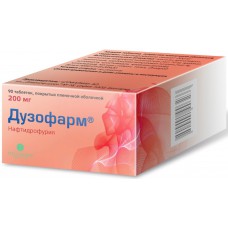Expiration date: 09/2026
Composition
1 tablet contains: active ingredient naphthydrofuryl oxalate 200 mg; excipients: lactose monohydrate; MCC; wheat starch; copovidone; silicon dioxide colloidal; magnesium stearate; talc. Shell composition: titanium dioxide; talc; magnesium stearate; macrogol 6000; methacrylic acid and ethylacrylate copolymer; sunset yellow dye (E110).
Pharmacological action
Dusopharm has a vasodilating effect, as a result of which it improves peripheral and cerebral blood circulation. It causes a decrease in peripheral vascular resistance and increases the minute volume of the heart, without significantly affecting heart rate and blood pressure.
The vasodilating effect of Dusopharm is the result of its direct myotropic, antagonistic to serotonin 5HT2 receptors and alpha-adrenoblocking action.
It has an M-holinoblocking effect.
It has a positive effect on cellular metabolism, improving the utilization of oxygen and glucose. This effect of the drug is due to its ability to increase ATP levels and inhibit the enzyme succinate dehydrogenase.
Activates glucose utilization through the citric acid cycle and increases the conversion of succinic acid to fumaric acid. As a result, the resistance of cells (including the brain) to hypoxia increases. In addition, Dusopharm reduces the increased viscosity of the blood.
Indications
The recovery period of cerebral circulatory disorders; peripheral circulatory disorders (intermittent lameness, Raynaud's disease, trophic ulcers).
Contraindications
Increased individual sensitivity to the drug. Myocardial infarction (acute stage).
Arterial hypotension. Hemorrhagic stroke (acute stage).
Epilepsy, increased convulsive readiness.
Stage II–III chronic heart failure (NYHA III–IV functional classification of heart failure by the New York Association of Cardiologists).
Tachyarrhythmias. Age under 18 years (efficacy and safety have not been established).
With caution: angle-closure glaucoma; prostate hyperplasia.
Side effects
When taken orally in doses from 300 to 600 mg, Dusopharm is well tolerated in general.
Possible side effects: nausea, vomiting, epigastric pain, intestinal colic, diarrhea, decreased appetite, headache, dizziness, sleep disturbance, reversible increase in liver enzyme activity, ulcers of the gastric mucosa, allergic reactions.
Interaction
Enhances the antihypertensive effect of antihypertensive drugs.
In this regard, it is recommended to monitor blood pressure more frequently at the beginning of combined treatment with Dusopharm and antihypertensive agents at the same time.
How to take it, the course of administration and dosage
Inside. Tablets are taken in their entirety, with a sufficient amount of liquid (it is recommended to wash them down with water).
For disorders of cerebral circulation: in a daily dose of 300 mg (2 tablets 3 times a day).
In case of peripheral circulatory disorders: daily doses - 500-600 mg, divided into 3 doses.
Dusopharm is recommended for long-term oral therapy (up to 6 months).
Dose adjustment in renal/ hepatic insufficiency is not required.
Overdose
Symptoms: increased severity of side effects, ventricular arrhythmia, anxiety, decreased blood pressure, bradycardia.
Treatment: gastric lavage, administration of activated charcoal and laxatives, symptomatic treatment.
There is no specific antidote.
Active substance
Naphthydrofuryl
Conditions of release from pharmacies
By prescription
Indications
Impaired cerebral circulation, Raynaud's disease, Dizziness,Impaired attention and memory


